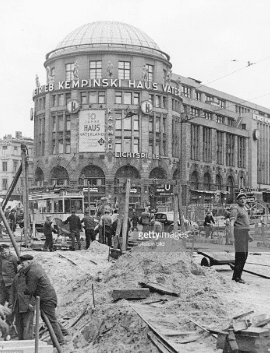Feature
By Karen W Siegemund
05-03-24
Born in 1928 in Berlin, my dad had been conscripted, with his entire high-school class, as a “Luftwaffenhelfer,” supporting the Luftwaffe at an anti-aircraft installation outside the city. But in the final days of the war, he found himself in Berlin. The following is an excerpt from his memoirs, As I Remember It, published in 2021. The book can be found here. This is Part 1 of the account.
How do you convey the experience of a city awaiting doom? How do you explain that here was a city which was about to be over-run, conquered, and in danger of being completely destroyed, but wasn’t, at least not completely. Fifty-plus years later, it’s easy to conjecture that, indeed, the inevitable doom didn’t happen. However, at that time, nobody knew what might actually happen. The worst of the air attacks were over. Downtown Berlin had, for all practical purposes, ceased to exist. Many other parts of the city were destroyed, but the telephone system, electricity, and water supply were functioning perfectly, and even gas was available although not all of the time. The extensive train system was running. I didn’t know then that the authorities were forcing work crews, at gunpoint, to keep the trains running, even during air raids.
I still remember the general feeling of desperation that emanated from everywhere, combined with the hope that it would soon be over. Remember, I was just 17 years old: whatever you experience sticks, and even at that age, you’re already well aware of peoples’ feelings and emotions, their fears of the present (don’t open your mouth too much) and of the future. The very absence of the “gold-pheasants,” the mustard colored medal-bedecked functionaries of the Nazi era, was noticeable. These people, to the extent they had some decency left, were about to commit suicide, like our local Nazi-party chief. Many more, however, had already fled the city awaiting its doom, or were hiding somewhere. The Nazi party bunch wasn’t exactly characterized by a high degree of intelligence, but they had the survival instinct of rats.
If you are brought up in world run on order, it’s difficult to understand why, when, where, and how such order ceases to exist. Order, as such, has nothing to do with Nazism, with injustice, or even cruelty. It has to do with the reason Germans will stand at a street corner, waiting for a red light to turn, with rain pouring down on them and no car coming; still, they don’t budge until the light turns green. It has to do with the belief that order is represented by bureaucracy and neatness of record-keeping, and that, sooner or later, that order will catch up with you; after all, the trains were still running, electricity was available! I simply didn’t fully comprehend at which point order becomes dysfunctional and that we were surrounded by a mere charade. But to a great extent, order persisted. When the Russians stormed Berlin, people were still talking, so to speak, across front lines. “Hey, the Russians are here already” – “not yet here” – “well, wait, they will be there soon enough.” The city trains were running, while fighting around them was going on. Of course, that was simply the inertia of a once-functioning system which had begun to break down much earlier. But people just kept it going.
In any event, I found myself in the Potsdam barracks, together with a bunch of other guys, some even in civilian clothes, others like myself in Luftwaffenhelfer uniform. They had no uniforms for any of us, no weapons, nothing. No preparations were made for an organized defense of the city, just an amassing of cannon fodder for the Nazi era’s upper crust, to cover them as they tried to get out, or to just delay the inevitable doom at any price. Berlin should or could have surrendered in the middle of April, but that would have been an admission of defeat. My own experience is, of course, limited to Berlin, but to the honor of many German officers, it’s become clear to me since then that many of them had only one goal in mind: to get as many of their men away from the Russian clutches and to deliver them to the British/American forces. This prospect doesn’t apply to Berlin itself, because once the Russians had pushed across the Oder, the city was encircled in a few days.
There was no organized attempt made to provide something worthy of the label “resistance.” There was no organized resistance against the Russian advance. We, whoever that was, were told to go that-a-way, and so we went that-a-way; “that-a-way” was always away from any shooting, from where the Russians were supposed to be. In other words, we moved gradually, and in a meandering way, toward downtown. We were hardly armed. At some point, somebody gave me a kind of bazooka, which I promptly deposited in a corner. But most importantly, nobody ever took up any position, ordered us to man a defense line, or any such thing.
Near the River Spree or one of the shipping canals, there was a storage space for steel plates and some of us just stayed and built ourselves some shelter, feeling relatively safe, until somebody said that the Russians were approaching the other side of the waterway and we moved out. Next, we stopped at a food storehouse, which seemed to be a good place to be. We stayed there, loading up with bread, a bologna kind of sausage, butter, cheese, and booze. We were, of course, under nobody’s command, although occasionally somebody appeared and gave a command, usually to move out. We were a kind of marauding soldateska, except that we didn’t harm anybody. I remember walking, on several nights, through streets lined with burning houses, nobody doing anything about it. There just was nobody around; nobody looting or plundering either, just nothing, just a burning city without any commotion. In the background, there was, of course, constant artillery fire, which you get used to.
How do you describe a dying city, rubble, artillery fire, no people, dust, dirt, smoke, but sunshine during the day, not even a remnant of order, no enforcement of anything, just nothing? Of course, there were no bomb attacks, just occasionally, groups of soldiers like us. When I say “us,” we weren’t a fixed group, but a kind of fluid or “dynamic” situation; people joining and others leaving. I remember that we came close to a spot where one fellow announced that this was where he had been living. In a short time, he was gone. I sure hope he made it.
| So, always walking in the direction opposite from where the Russians were supposed to be, we approached downtown. At times we must have slept, I simply don’t recall. At some point, we reached the Brandenburg Gate and the Pariser Plaza. While seeking shelter, we ended up in the ruins of a building but somebody came and advised us that this was neutral territory, the Swiss embassy or what was left of it, and that was not much. Of course, this was utterly ridiculous, though, technically possibly true; and we, being Germans accustomed to order, duly left. We must have entered the underground system at one point; this can be understood literally, as well as figuratively. Literally, because of the general darkness (some emergency lights were on, who knows what powered them); figuratively, because my uniformed status became, let me say, obscured. Walking around, some others and I ended up near Anhalter Bahnhof, one of the many Berlin railway stations where we were above ground for a short while. It must have been April 28 or 29 or thereabouts. I still had some food left, I believe a large loaf of bread. I try to remember what I drank; booze comes to mind, but that wasn’t sufficient. The underground railway, or any other railway, had ceased to run. Earlier, I mentioned that I’d been wondering where the people were. Now I knew: they filled the underground stations and part of the tunnel system. This proved to be very advantageous; we didn’t realize this immediately, but in fact we became gradually isolated from any military order and hid in relative safety in the crowd, in the dark. Not completely, though, because occasionally SS units would pass through the tunnel; we had to completely avoid them. They spelled trouble. The subway was really a marvel of engineering; we and thousands upon thousands of people were in these safe places. Otherwise, though, you might describe this as the epitome of being in the wrong place: we were about a quarter mile or so away from Hitler’s bunker. Later, I read that the Russian army had about 2,000 pieces of artillery trained on that area; this barrage went on for days, with only occasional lulls in between periods of incessant, waxing and waning bombardments. Believe it or not, you get used the constant rumble and shaking. Also, after more than five years of war – four years of bombings –people did get used to a lot; if not, they went crazy. There was chaos all around, but people can get used to that, too. And now, I faced the third, underground problem/ situation–namely: how to escape capture by the Russians as a prisoner of war. I must admit that somehow, but really incomprehensibly, I wasn’t consciously aware of that danger. Clearly, one can interpret this to be an unbelievably stupid aspect of ignorance and naiveté. But, in my own defense, I have to say that, up to that point, I worked actively on my survival. That lead all of us, and of course me, gradually to the retreat position in the center of Berlin, right under the guns trained on Hitler. I wasn’t stupid enough to face the danger above ground, but believed (justifiably so) in the solidity of German subway engineering. Now, most importantly, we had literally reached the end of the line! I must confess, however, that I wasn’t really–consciously, intellectually–aware of that until an older guy, with whom I had roamed the underground for the last few days, said that we should get ourselves some civilian clothes. We were in the underground station right at the Brandenburg Gate called Unter den Linden. Adolf Hitler was somewhere fairly close by and the Russians were closing in. That’s when I realized there was nowhere else to retreat to. We were surrounded by thousands of frightened people. They, of course, wouldn’t harm us although I won’t forget a lady who openly displayed her unrelenting faith in the Führer. No one voiced agreement, so we felt safe–away from that lady. And the “real” civilians were undoubtedly afraid to associate with us. And there were still SS units occasionally coming through the tunnel, though not often. Earlier, when we were roaming the streets during the day, I don’t remember seeing the SS at all. They were supposed to protect the Nazis; the SS role was well known at that time although not all of its infamous details. So, in order to convert into civilians, we had to find, in modern parlance, a “window” between the departure of any SS unit from the station and into the tunnel, and the arrival of the Russians. Finding civilian clothes was no problem. We didn’t have to steal any, as there was so much abandoned stuff around. So the problem was when to doff the uniform and put the civilian clothes on. We found, in time, the appropriate window; in the early morning hours of May 2nd there was a lull, and my companion and I became civilians. For me, there were some kind of pants–not too well-fitting–and a sweater. As I later found out, it was full of lice. I wondered, being by upbringing a neat German, if I would have rejected that sweater had I known of its lice content, thus possibly endangering myself and becoming a prisoner of war. Of course, there was so much stuff around, but possibly, that too was all full of lice; ah well, I wasn’t confronted with that “problem.” We did become civilians, and now mixed with the others. Shortly after our conversion to civilian status, someone came down the stairs of the subway station–the Russians hadn’t arrived yet–and announced that Adolf Hitler was dead. That was certainly believable and was greeted with something close to indifference, but he also announced that Hitler had gotten married. Now, that was totally unbelievable, so maybe, people believed none of it to be true. Shortly thereafter, the first Russian appeared. I’ll never forget the appearance. He didn’t brandish a gun, he didn’t threaten anybody, but he had over his shoulder a big sack in which he collected and gathered watches. He seemed very jovial, and in hindsight, this represented to me an interesting blend of looting and capitalism, and the survival of the latter in Soviet Russia. He, in effect, preceded the armed forces to loot from the vanquished, before the vanquished were really vanquished. How did he know that he wouldn’t be greeted by SS snipers? After all, not too long before, the SS had been coming through. He didn’t seem to be scared one bit. Somehow, he knew exactly when to make his appearance, just as we had timed to become civilians. Of course, at that time, this was taken as a hopeful sign for the future. We just didn’t know what to expect. Actually, we had expected a bunch of soldiers, brandishing and possibly using Tommy guns. I didn’t have a watch to contribute to his fortune, but many did. Soon, some official-looking Russian soldier or officer entered and suggested (no, he did not force us!) to get out and go home–whatever that may have meant to many of us. This was, as it turned out, a very important phase in the turn of events. Just about that time, early morning May 2nd, the SS exploded some bombs or whatever charges they had placed on the bottom of the river Spree, right where the river actually crossed above the subway. Obviously, the subway was deeper than the river bed, and all the subway tunnels rapidly filled with water until, within a few hours, the entire subway system of Berlin was drowned. This subway system, and particularly the stations, were occupied by many thousands of people. The calamity occurred a few hours after the war in Berlin had actually ended, so many people – myself included – were already out. Actually, I learned about this flooding many days later. Nobody can even begin to guess how many people may have drowned. It is possible that those still in the stations may have seen the water coming; I doubt that it was a vast wall of flowing water, because there was a single source–where the Spree crossed over the subway. The subway system had many branches into which the water was distributed. Still, I believe that many [hundreds] died. End of Part I From the Balcony is a reader-supported publication. © 2024 Karen W Siegemund Calabasas, CA Karen Siegmund, PhD, is President of the American Freedom Alliance, a former teacher and prior to that, worked as a developer for U.S. Navy sonar systems. More info HERE |
Link to Substack App: Introducing the Substack app








